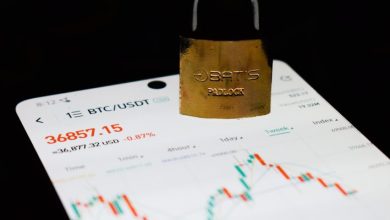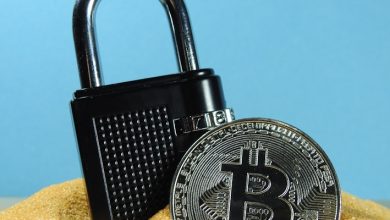Myth: Crypto Is Not Secure and Is Prone to Hacks

- Understanding the Misconception Surrounding Crypto Security
- Debunking the Myth of Insecurity in the Crypto World
- Exploring the Layers of Security in Cryptocurrency
- Why Crypto Is Safer Than You Think: A Closer Look
- The Truth About Hacks and Vulnerabilities in Crypto
- How to Safeguard Your Crypto Assets from Potential Threats
Understanding the Misconception Surrounding Crypto Security
Despite the common misconception that cryptocurrencies are not secure and are prone to hacks, the reality is quite different. The security of cryptocurrencies is based on advanced cryptographic techniques that make them highly secure and resistant to hacking attempts.
One of the primary reasons for the misconception surrounding crypto security is the high-profile hacks that have occurred in the past. While it is true that there have been instances of exchanges being hacked and funds being stolen, it is important to note that these hacks were not due to any inherent flaw in the cryptocurrency itself, but rather the result of vulnerabilities in the exchange’s security measures.
Cryptocurrencies themselves are built on a decentralized blockchain technology that makes them highly secure. Each transaction is encrypted and verified by a network of computers, making it nearly impossible for hackers to manipulate the system. Additionally, users have control over their private keys, which are essential for accessing and transacting their cryptocurrency holdings.
To further enhance security, users can store their cryptocurrencies in hardware wallets or cold storage, which are offline devices that are not connected to the internet. This adds an extra layer of protection against potential hacking attempts.
Overall, while it is true that there have been security incidents in the world of cryptocurrencies, it is important to understand that these are not indicative of the overall security of the technology. With proper security measures in place, cryptocurrencies can be a safe and secure way to store and transact value in the digital age.
Debunking the Myth of Insecurity in the Crypto World
There is a common misconception that the crypto world is not secure and is prone to hacks. However, this myth is far from the truth. In reality, cryptocurrencies are built on blockchain technology, which is known for its high level of security. The decentralized nature of blockchain makes it extremely difficult for hackers to manipulate the system.
Furthermore, many cryptocurrencies employ advanced encryption techniques to protect transactions and user data. These encryption methods ensure that sensitive information remains secure and cannot be easily accessed by unauthorized parties. Additionally, most cryptocurrencies have robust security protocols in place to detect and prevent any potential threats.
It is important to note that while there have been instances of hacks in the crypto world, the majority of these breaches were due to vulnerabilities in individual exchanges or wallets, rather than the underlying technology itself. By taking proper precautions, such as using reputable exchanges, enabling two-factor authentication, and storing cryptocurrencies in secure wallets, investors can significantly reduce the risk of being hacked.
Exploring the Layers of Security in Cryptocurrency
When it comes to the security of cryptocurrency, there are multiple layers in place to protect against hacks and unauthorized access. These layers work together to create a robust system that ensures the safety of digital assets.
One of the primary security measures in cryptocurrency is encryption. Encryption involves encoding information in such a way that only authorized parties can access it. This is crucial in protecting the privacy and security of transactions.
Another layer of security is two-factor authentication (2FA). 2FA requires users to provide two different forms of identification to access their accounts, adding an extra level of security beyond just a password. This helps prevent unauthorized access even if a password is compromised.
Additionally, many cryptocurrency platforms implement cold storage solutions for storing digital assets. Cold storage involves keeping private keys offline, away from the internet, making it much harder for hackers to access them. This significantly reduces the risk of theft.
Furthermore, regular security audits and updates are conducted to identify and address any potential vulnerabilities in the system. This proactive approach ensures that any security issues are promptly addressed, minimizing the risk of hacks.
Overall, the layers of security in cryptocurrency work in tandem to create a secure environment for users to transact and store their digital assets. By implementing encryption, 2FA, cold storage, and regular security audits, cryptocurrency platforms can effectively protect against hacks and ensure the safety of user funds.
Why Crypto Is Safer Than You Think: A Closer Look
When it comes to cryptocurrency, many people have misconceptions about its security. However, a closer look reveals that crypto is actually safer than you might think.
One of the key reasons why crypto is secure is because of the technology behind it. Blockchain, the decentralized ledger that records all transactions, makes it nearly impossible for hackers to manipulate the system. Each transaction is encrypted and linked to the previous one, creating a secure network that is resistant to fraud.
Additionally, crypto exchanges have implemented robust security measures to protect users’ funds. Two-factor authentication, cold storage for storing funds offline, and regular security audits are just some of the measures in place to prevent hacks.
Moreover, the transparency of the blockchain allows users to verify transactions and track their funds in real-time. This level of transparency provides an added layer of security, as any suspicious activity can be quickly identified and addressed.
While no system is completely foolproof, it is clear that crypto is much safer than the myths would have you believe. By understanding the technology and security measures in place, you can feel confident in using cryptocurrency for your transactions.
The Truth About Hacks and Vulnerabilities in Crypto
It is a common misconception that cryptocurrencies are not secure and are prone to hacks and vulnerabilities. However, the truth is that while there have been instances of hacks and vulnerabilities in the crypto space, the technology behind cryptocurrencies is actually quite secure when used properly.
One of the reasons why cryptocurrencies are considered secure is because of the use of blockchain technology, which is essentially a decentralized and immutable ledger that records all transactions. This means that once a transaction is recorded on the blockchain, it cannot be altered or deleted, making it extremely difficult for hackers to manipulate the system.
Additionally, cryptocurrencies use cryptographic techniques to secure transactions and protect user data. This means that even if a hacker were able to gain access to a user’s wallet, they would still need to decrypt the information in order to steal the funds, which is no easy task.
While it is true that there have been hacks and vulnerabilities in the past, it is important to note that these incidents were often due to human error or negligence, rather than a flaw in the underlying technology itself. By taking proper precautions, such as using secure wallets, enabling two-factor authentication, and keeping software up to date, users can greatly reduce the risk of falling victim to a hack.
How to Safeguard Your Crypto Assets from Potential Threats
To safeguard your crypto assets from potential threats, it is crucial to follow best practices for security. One of the most important steps is to use a hardware wallet to store your cryptocurrencies securely. Hardware wallets are physical devices that store your private keys offline, making them less vulnerable to hacking attempts compared to online wallets.
Another essential security measure is to enable two-factor authentication (2FA) on all your crypto exchange and wallet accounts. 2FA adds an extra layer of security by requiring you to provide a second form of verification, such as a code sent to your mobile device, in addition to your password.
It is also advisable to regularly update your software and firmware to protect against any known vulnerabilities. Additionally, be cautious of phishing attempts and never share your private keys or seed phrases with anyone. Remember to use strong, unique passwords for each of your accounts and consider using a password manager to securely store them.
Lastly, stay informed about the latest security threats and trends in the crypto space. By staying vigilant and proactive, you can significantly reduce the risk of falling victim to hacks and other security breaches. By implementing these security measures, you can protect your crypto assets and have peace of mind knowing that you have taken steps to safeguard them against potential threats.



